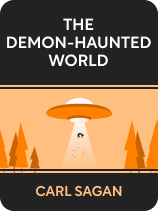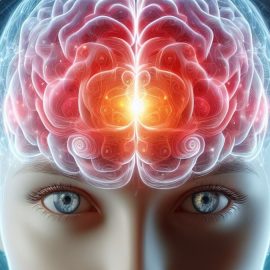

This article is an excerpt from the Shortform book guide to "The Demon-Haunted World" by Carl Sagan. Shortform has the world's best summaries and analyses of books you should be reading.
Like this article? Sign up for a free trial here .
What is anti-science? Is it different from scientific skepticism? What are some of the most common criticisms of science?
Science isn’t perfect. It should be challenged, questioned, and even criticized. Some of these criticisms, though, don’t hold water and amount to what could be called anti-science. This is the view of Carl Sagan, who discusses anti-science and addresses four of the most common criticisms that scientists face: science is evil, science is too narrow, science changes too fast, and we might be better off not knowing.
Let’s take a look at how Sagan explains anti-science and unpacks these four criticisms.
Anti-Science Rhetoric
Science and reason have the ability to upend or throw into question conventional wisdom. New discoveries often challenge our cherished beliefs. For this and many other reasons, Sagan claims, science is often criticized by both the masses and the powerful few. Some of the criticisms of science are valid, but they don’t hold weight when more carefully considered.
So, what is anti-science? Sagan answers this question by distinguishing it from scientific skepticism. Science is a skeptical practice by nature, he claims. But it’s not doubt for the sake of doubting. Scientific skepticism is about coming to a better understanding of the way the world works. When this skepticism calls into question our views, or when a scientific discovery dismantles a widely-held belief system, it may come across as too dismissive and overreaching. To some, it may feel like a personal attack. The things we believe in are a big part of who we are. It is easy to see why people are reluctant to let go of them so easily and why the people or processes questioning those beliefs might come under attack.
| The Psychology of Beliefs Sagan argues that many people reject science because it challenges their beliefs, which form their identities. Psychologists agree and provide insight on why beliefs are so intertwined with identity: They’re strongly connected to our emotions and values. Both connections make people resistant to changing their beliefs. When people are emotionally attached to their beliefs, they imbue them with a sense of importance and meaning, often feeling that those beliefs give their life purpose. Strong emotional attachment also indicates a connection to values—underlying principles or standards for behavior. People are highly resistant to changing their values, as they feel their values guide their decision-making in life. For this reason, if a scientific finding calls into question something on which a person’s very concept of morality is based, it’s going to be much more difficult for them to accept. Therefore, those who base much of their moral and ethical codes on, for example, religious beliefs, may resist new scientific discoveries more strongly than others who don’t. |
Sagan argues that belief systems aren’t just what keeps individuals going: They also shape society as a whole. They are a major driver of the status quo. Because of this, the main benefactors of the status quo (in other words, the dominant social or political establishments) will also be quick to condemn and criticize the ideas, methods, and practitioners of science.
For example, belief in the divine right of kings kept monarchies going for centuries. To question this divine right was to question the authority that ruled over you. Similarly, to question the veracity of witchcraft accusations was to question the Catholic Church itself and was a punishable act in its own right. Sagan says the people in control won’t relinquish their control easily. If attacking science or impugning, imprisoning, or killing scientists will keep them in power, they won’t hesitate to do so.
| Historical Perspective: Attacks on Scientists Sagan argues that the powerful few will attack a scientific theory if it jeopardizes their power, and history shows this to be true. There are many instances of institutions attacking science, scientists, or anyone else who threatened the power of the institutions. Importantly, though, when the argument is strong and has enough support from both the academic world and the general public, the science survives these attacks. Galileo was convicted for supporting the heliocentric theory proposed by Copernicus. In 1633, he was accused of heresy by the Catholic Church and sentenced to house arrest for the rest of his life. Not only this, but his publishings on the heliocentric theory were banned. As the scientific revolution changed the way society viewed the world, and other scientists confirmed the heliocentric theory, the Catholic Church slowly retracted its condemnation of Galileo. As recently as 1992, Pope John Paul II admitted the Catholic Church was wrong and officially “rehabilitated” Galileo. Despite this, one in four Americans still believes the sun revolves around the Earth. Though Charles Darwin wasn’t ever officially condemned by the Catholic Church, Christian fundamentalists have criticized the theory of evolution since its inception. While evolution by natural selection is widely accepted by scientists, the numbers are much lower among the rest of the population. Only 65% of US adults believe humans and other creatures evolved. Even when a theory is broadly accepted among the scientific community, getting the rest of the population to accept it can be a challenge. |
The 4 Common Criticisms
Anti-science rhetoric has persisted into the present day. Sagan, and virtually every other scientist, will admit science isn’t perfect. In the end, though, the pursuit of knowledge is essential, and any arguments against science aren’t strong enough to justify ending or abating this pursuit. Here are a few more common critiques of science that Sagan addresses in The Demon-Haunted World.
#1: Science Is Evil
People may criticize science as immoral or evil, pointing to the threats of climate change and nuclear catastrophe or the detrimental effects of technology. Though scientific advancements have indeed led to some negative consequences, Sagan argues that the good outweighs the bad.
For example, science is responsible for enormous advancements in health and medicine, increasing life expectancy dramatically. Science is behind improvements in agriculture, communication, and transportation, vastly raising the standard of living for billions of people. Scientific research has provided invaluable information on the origins and natures of our species, our planet, and the universe. Despite its potential weaknesses, science is capable of remarkable achievements that contribute to the benefit and prosperity of everyone.
| Other Reasons People Think Science Is Evil Researchers have found that although science is a well-respected profession, many people still associate scientists with immoral conduct. There are several potential reasons for this association that Sagan doesn’t touch on. People are motivated by their ideologies: If people don’t agree with scientists’ conclusions, they’ll be more likely to find them wrong or immoral. Scientists are blamed for societal deterioration: Some people are suspicious or critical of science because they link scientific progress with moral decline, pessimism, and potential technological disaster. For example, the public’s anxiety about nuclear energy indicates worry about technological catastrophe. The mad scientist trope distorts views on scientists: The stereotype of the evil or crazy scientist is seen throughout our culture (Dr. Strangelove, Frankenstein). This pervasive stereotype can damage scientists’ reputations. Widely publicized cases of fraud make scientists seem corrupt: When a scientist violates ethical standards through plagiarism or falsification of data, it sometimes becomes a big news story, further damaging the reputation of scientists. |
#2: Science Is Too Narrow, Restrictive, and Reductive
Because of its skeptical and critical nature, some may say science is too quick to rule out any sort of explanation without physical evidence. It constrains a vast world of possibilities into a much smaller world of provable reality. It sets limits on what we can and can’t do. It tries to explain the complexity of the universe with mere mathematical equations and laws of nature. But the laws of nature, Sagan says, are an observable fact. They have been proven through calculated testing and retesting of hypotheses. The way the world works has nothing to do with our beliefs, assumptions, or desires.
(Shortform note: Some suggest that one reason science is seen as too narrow or restrictive is that it fails to explain why things matter. Science may be able to explain things about the natural world with more and more accuracy, but it has yet to provide people the emotional value they seek from religion or other supernatural explanations. Science may disprove some religious teachings, but it doesn’t provide any valuable alternatives, and it may never be able to.)
#3: Science Changes Too Quickly
Just when we think we understand something about the world, scientists say this is no longer true. New discoveries are constantly being made that disprove a previously ironclad scientific theory. To some, this may make science seem as if it is erratic or arbitrary. But this is simply the way science is supposed to work. The fact that things are always changing is a sign that we are making progress and that no idea or theory is beyond criticism or reevaluation.
| Convincing Others to Change Their Mind Perhaps one reason people criticize the constant changing in science is that we are naturally resistant to change, even when presented with facts. A recent example of this sort of criticism can be seen in the government’s changing guidance on Covid-19 measures and the public’s response. As scientists learned more about the transmission of Covid-19, the guidelines on mask-wearing, vaccines, and social distancing also changed. The CDC and elected officials have received a lot of criticism for their ever-changing advice on face masks and other covid measures. There are, however, some ways we can better influence others to change their minds, such as finding common ground, framing our views in a positive light, and allowing others a sense of agency over their choices. |
#4: We May Be Better Off Not Knowing
Some suggest we may be better off without some of the knowledge science provides. What if a major scientific discovery with profound implications completely unravels an otherwise orderly society? Is releasing this information necessary if it doesn’t benefit the general public?
Sagan suggests that, no matter the case, we are better off knowing the truth. It is preferable to know the way things are rather than believe in a reassuring delusion. The potential consequences of some world-shattering discoveries are probably overestimated. Furthermore, no human, or group of humans, is wise enough to correctly determine what knowledge should be withheld from the rest of humanity. No one should have that power.
| Science: Openness Versus Secrecy Sagan maintains that science should remain accessible to the public as much as possible. Researchers suggest, though, that while openness is an important scientific principle, there are limits: There may be good reasons for maintaining some secrecy in research. Such reasons include protecting intellectual property, protecting the privacy of research participants or scientists, and protecting populations from threats to national or international security. Some of the cases regarding the withholding of research raise some troubling issues. Biomedical companies, for example, have been known to not publish the results of clinical trials that present their products as risky or dangerous. In the case of national security, the government has deemed some scientific findings too risky to publish because they fear terrorist organizations will use them to create biological or chemical weapons. In such cases, we have to consider the potential risks and benefits of publishing certain studies, as well as the scientists’ right to free speech. |
| Fallacious Anti-Science Arguments Sagan provides common examples of rhetorical fallacies. It is important to understand how they work for any argument, but with climate change denial growing, understanding in particular how they’re used to criticize science is crucial. Scientists found common rhetorical techniques used for science denial across a range of topics including climate change and evolution. There are five common techniques of science denial: Fake experts: When an unqualified person or institution is presented as a source of credible information. This can be seen as an extension of the appeal to authority. It is not the person’s credentials that matter, but their argument. An example might be: “A retired physicist argues that the current weather change is completely natural.” Logical fallacies: Also known as nonsequiturs. There are many logical fallacies used to deny science. Here are examples: “Climate science can’t be trusted because climate scientists are biased.” (Ad hominem) “Climate has changed naturally in the past, so current climate change must also be natural.” (False dichotomy) “In the 1970s, climate scientists predicted there would be an ice age.” (Straw man) Impossible expectations: Demanding unrealistic standards of certainty before acting on the science. For example, “Scientists don’t know what the climate will be like decades from now.” Cherry picking: Selecting data that supports your argument while ignoring data that contradicts it. For instance, “There are record low temperatures today—whatever happened to global warming?” Conspiracy theories: In regard to science denial, this often involves some secret plan to hide the truth for nefarious reasons. An example could be: “The temperature record is fabricated by scientists to push a socialist agenda.” |

———End of Preview———
Like what you just read? Read the rest of the world's best book summary and analysis of Carl Sagan's "The Demon-Haunted World" at Shortform .
Here's what you'll find in our full The Demon-Haunted World summary :
- Carl Sagan’s argument that a less scientifically-minded society is a less prosperous one
- Why you must remain critical and well-informed in an increasingly complex world
- The decline of educational standards in America and possible ways to reverse it






